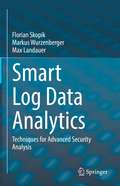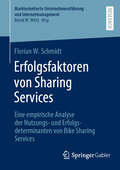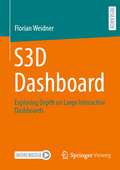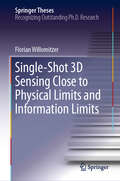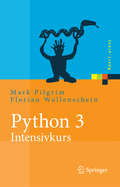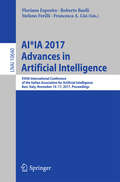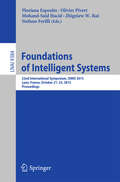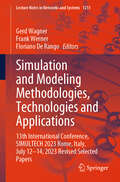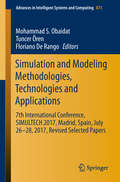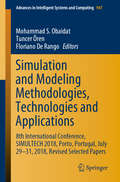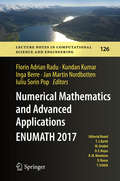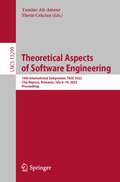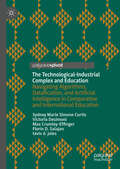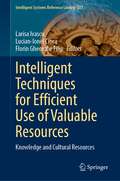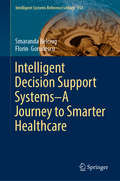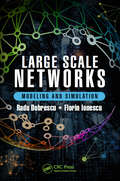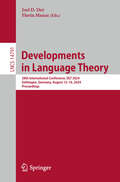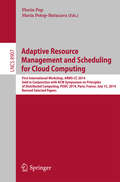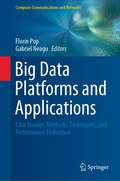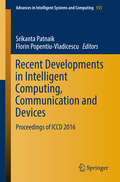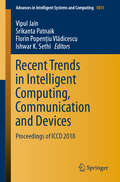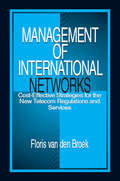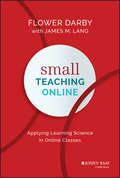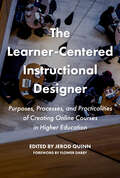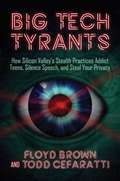- Table View
- List View
Smart Log Data Analytics: Techniques for Advanced Security Analysis
by Florian Skopik Markus Wurzenberger Max LandauerThis book provides insights into smart ways of computer log data analysis, with the goal of spotting adversarial actions. It is organized into 3 major parts with a total of 8 chapters that include a detailed view on existing solutions, as well as novel techniques that go far beyond state of the art. The first part of this book motivates the entire topic and highlights major challenges, trends and design criteria for log data analysis approaches, and further surveys and compares the state of the art. The second part of this book introduces concepts that apply character-based, rather than token-based, approaches and thus work on a more fine-grained level. Furthermore, these solutions were designed for “online use”, not only forensic analysis, but also process new log lines as they arrive in an efficient single pass manner. An advanced method for time series analysis aims at detecting changes in the overall behavior profile of an observed system and spotting trends and periodicities through log analysis. The third part of this book introduces the design of the AMiner, which is an advanced open source component for log data anomaly mining. The AMiner comes with several detectors to spot new events, new parameters, new correlations, new values and unknown value combinations and can run as stand-alone solution or as sensor with connection to a SIEM solution. More advanced detectors help to determines the characteristics of variable parts of log lines, specifically the properties of numerical and categorical fields.Detailed examples throughout this book allow the reader to better understand and apply the introduced techniques with open source software. Step-by-step instructions help to get familiar with the concepts and to better comprehend their inner mechanisms. A log test data set is available as free download and enables the reader to get the system up and running in no time.This book is designed for researchers working in the field of cyber security, and specifically system monitoring, anomaly detection and intrusion detection. The content of this book will be particularly useful for advanced-level students studying computer science, computer technology, and information systems. Forward-thinking practitioners, who would benefit from becoming familiar with the advanced anomaly detection methods, will also be interested in this book.
Erfolgsfaktoren von Sharing Services: Eine empirische Analyse der Nutzungs- und Erfolgsdeterminanten von Bike Sharing Services (Marktorientierte Unternehmensführung und Internetmanagement)
by Florian W. SchmidtIn diesem Band werden zunächst die Erfolgsfaktoren und der Erfolg von Bike Sharing Services konzeptionalisiert und operationalisiert. Darauf aufbauend wird auf Basis des IS-Success Model ein Erklärungsmodell für den Erfolg von Bike Sharing Services abgeleitet.
S3D Dashboard: Exploring Depth on Large Interactive Dashboards
by Florian WeidnerOver the last decades, the interior of cars has been constantly changing. A promising, yet unexplored, modality are large stereoscopic 3D (S3D) dashboards. Replacing the traditional car dashboard with a large display and applying binocular depth cues, such a user interface (UI) could provide novel possibilities for research and industry. In this book, the author introduces a development environment for such a user interface. With it, he performed several driving simulator experiments and shows that S3D can be used across the dashboard to support menu navigation and to highlight elements without impairing driving performance. The author demonstrates that S3D has the potential to promote safe driving when used in combination with virtual agents during conditional automated driving. Further, he present results indicating that S3D navigational cues improve take-over maneuvers in conditional automated vehicles. Finally, investigating the domain of highly automated driving, he studied how users would interact with and manipulate S3D content on such dashboards and present a user-defined gesture set.
Single-Shot 3D Sensing Close to Physical Limits and Information Limits (Springer Theses)
by Florian WillomitzerThis thesis discusses the physical and information theoretical limits of optical 3D metrology, and, based on these principal considerations, introduces a novel single-shot 3D video camera that works close to these limits. There are serious obstacles for a “perfect” 3D-camera: The author explains that it is impossible to achieve a data density better than one third of the available video pixels. Available single-shot 3D cameras yet display much lower data density, because there is one more obstacle: The object surface must be “encoded” in a non-ambiguous way, commonly by projecting sophisticated patterns. However, encoding devours space-bandwidth and reduces the output data density. The dissertation explains how this profound dilemma of 3D metrology can be solved, exploiting just two synchronized video cameras and a static projection pattern.The introduced single-shot 3D video camera, designed for macroscopic live scenes, displays an unprecedented quality and density of the 3D point cloud. The lateral resolution and depth precision are limited only by physics. Like a hologram, each movie-frame encompasses the full 3D information about the object surface and the observation perspective can be varied while watching the 3D movie.
Python 3 - Intensivkurs
by Mark Pilgrim Florian WollenscheinPython ist eine vollwertige Programmiersprache, mit der sich auch größere Anwendungen entwickeln lassen. In den letzten Jahren hat sie an Beliebtheit gewonnen, und mit Python 3 steht eine stark erweiterte Version zur Verfügung. In dem Band werden die Werkzeuge und Programmiermöglichkeiten praxisorientiert vorgestellt. Jedes Kapitel beginnt mit einem vollwertigen, lauffähigen Codebeispiel, das jeweils ausführlich analysiert wird. Im Vordergrund stehen die unmittelbare praktische Anwendung und die Realisierung von Projekten mit Python 3.
AI*IA 2017 Advances in Artificial Intelligence: XVIth International Conference of the Italian Association for Artificial Intelligence, Bari, Italy, November 14-17, 2017, Proceedings (Lecture Notes in Computer Science #10640)
by Stefano Ferilli Roberto Basili Floriana Esposito Francesca A. LisiThis book constitutes the refereed proceedings of the 16th International Conference of the Italian Association for Artificial Intelligence, AI*IA 2017, held in Bari, Italy, in November 2017. The 37 full papers presented were carefully reviewed and selected from 91 submissions. The papers are organized in topical sections on applications of AI; natural language processing; knowledge representation and reasoning; knowledge engineering, ontologies and the semantic web; machine learning; philosophical foundations, metacognitive modeling and ethics; and planning and scheduling.
Foundations of Intelligent Systems
by Stefano Ferilli Olivier Pivert Floriana Esposito Mohand-Said Hacid Zbigniew W. RásThis book constitutes the refereed proceedings of the 22ndInternational Symposium on Methodologies for Intelligent Systems, ISMIS 2015,held in Lyon, France, in October 2015. The 31 revised full papers presented together with 18short papers were carefully reviewed and selected from 67 submissions. Thepapers are organized in topical sections on data mining methods; databases,information retrieval, recommender systems; machine learning; knowledgerepresentation, semantic web; emotion recognition, music information retrieval;network analysis, multi-agent systems; applications; planning, classification;and textual data analysis and mining.
Simulation and Modeling Methodologies, Technologies and Applications: 13th International Conference, SIMULTECH 2023 Rome, Italy, July 12-14, 2023 Revised Selected Papers (Lecture Notes in Networks and Systems #1211)
by Gerd Wagner Frank Werner Floriano De RangoThis book includes a set of selected best extended papers from the 13th International Conference on Simulation and Modeling Methodologies, Technologies and Applications (SIMULTECH 2023), that was held in Rome, Italy, from July 12 to 14. The conference brought together researchers, engineers, and practitioners interested in methodologies and applications of modeling and simulation. New and innovative solutions are reported in this book. A selection was made after the conference, based also on the conference chairs assessment, reviewers’ assessment, quality of presentation, and audience interest, so that this book includes the extended and revised versions of the very best papers of the conference. New and innovative solutions are reported in this book.
Simulation and Modeling Methodologies, Technologies and Applications: 7th International Conference, SIMULTECH 2017 Madrid, Spain, July 26–28, 2017 Revised Selected Papers (Advances in Intelligent Systems and Computing #873)
by Mohammad S. Obaidat Tuncer Ören Floriano De RangoThis book highlights a set of selected, revised and extended papers from the 7th International Conference on Simulation and Modeling Methodologies, Technologies and Applications (SIMULTECH 2017), held in Madrid, Spain, on July 26 to 28, 2017. The conference brought together researchers, engineers and practitioners whose work involves methodologies in and applications of modeling and simulation. The papers showcased here represent the very best papers from the Conference, and report on a broad range of new and innovative solutions.
Simulation and Modeling Methodologies, Technologies and Applications: 8th International Conference, SIMULTECH 2018, Porto, Portugal, July 29-31, 2018, Revised Selected Papers (Advances in Intelligent Systems and Computing #947)
by Mohammad S. Obaidat Tuncer Ören Floriano De RangoThis book includes a selection of papers from the 8th International Conference on Simulation and Modeling Methodologies, Technologies and Applications (SIMULTECH 2018), held in Porto, Portugal, from July 29 to 31, 2018. Presenting new and innovative solutions, the book features extended and revised versions of the very best conference papers as well as the latest research in the field.
Numerical Mathematics and Advanced Applications ENUMATH 2017 (Lecture Notes in Computational Science and Engineering #126)
by Jan Martin Nordbotten Florin Adrian Radu Kundan Kumar Inga Berre Iuliu Sorin PopThis book collects many of the presented papers, as plenary presentations, mini-symposia invited presentations, or contributed talks, from the European Conference on Numerical Mathematics and Advanced Applications (ENUMATH) 2017. The conference was organized by the University of Bergen, Norway from September 25 to 29, 2017. Leading experts in the field presented the latest results and ideas in the designing, implementation, and analysis of numerical algorithms as well as their applications to relevant, societal problems.ENUMATH is a series of conferences held every two years to provide a forum for discussing basic aspects and new trends in numerical mathematics and scientific and industrial applications. These discussions are upheld at the highest level of international expertise. The first ENUMATH conference was held in Paris in 1995 with successive conferences being held at various locations across Europe, including Heidelberg (1997), Jyvaskyla (1999), lschia Porto (2001), Prague (2003), Santiago de Compostela (2005), Graz (2007), Uppsala (2009), Leicester (2011), Lausanne (2013), and Ankara (2015).
Theoretical Aspects of Software Engineering: 16th International Symposium, TASE 2022, Cluj-Napoca, Romania, July 8–10, 2022, Proceedings (Lecture Notes in Computer Science #13299)
by Yamine Aït-Ameur Florin CrăciunThis book constitutes the proceedings of the 16th International Conference on Theoretical Aspects of Software Engineering, TASE 2022, held in Cluj-Napoca, Romania, July 2022. The 21 full regular papers presented together with 5 short papers in this book were carefully reviewed and selected from 71 submissions. The topics of the papers covering various fields in software engineering and the latest developments in in formal and theoretical software engineering methods and techniques.
The Technological-Industrial Complex and Education: Navigating Algorithms, Datafication, and Artificial Intelligence in Comparative and International Education
by Florin D. Salajan tavis d. jules Max Crumley-Effinger Sydney Marie Curtis Victoria DesimoniThis Pivot book looks at the ways in which disruptive technologies, datafication, and Artificial Intelligence (AI) are shaping Comparative and International (CIE) Education and leading to its platformization. CIE entails the study of foreign educational systems in comparative perspective to discern what can be learned from approaches in various educational contexts and how these approaches might be applicable to other educational systems. The advent of advanced technologies, particularly AI, has been a game changer for research, teaching, and learning methods. It is within this context and at the intersection of deglobalization (and the retreat towards regionalization) and the rise of the fourth industrial revolution—that blends the biological, physical, and cyber-physical together—that this project seeks to describe the benefits and consequences of datafication and AI for the field of CIE.
Intelligent Techniques for Efficient Use of Valuable Resources: Knowledge and Cultural Resources (Intelligent Systems Reference Library #227)
by Florin Gheorghe Filip Larisa Ivascu Lucian-Ionel CiocaThe book aims at presenting a multidisciplinary view meant to illustrate several significant efforts and results about the contribution of information technologies to make available new resources and enable rationally usage the existing ones in the context of the ever-growing trends to use ever more resources. Authors from various countries have been invited to contribute so that a rather broad and balanced image about the current trends and recent results obtained could result. The proposed book addresses methodologies and information technology-based tools and systems designed for the efficient use of diverse resources such as manpower and human knowledge, natural resources including water, raw materials and end of life products, financial assets, datasets, and even cultural goods. The book is organized in ten chapters. It is intended to be insightful for researchers, instructors, and planers from various domains. It can also be used as an auxiliary material for postgraduate studies in applied informatics, business administration, industrial engineering, engineering and management, computer, and digital humanities.
Intelligent Decision Support Systems—A Journey to Smarter Healthcare (Intelligent Systems Reference Library #157)
by Smaranda Belciug Florin GorunescuThe goal of this book is to provide, in a friendly and refreshing manner, both theoretical concepts and practical techniques for the important and exciting field of Artificial Intelligence that can be directly applied to real-world healthcare problems. Healthcare – the final frontier. Lately, it seems like Pandora opened the box and evil was released into the world. Fortunately, there was one thing left in the box: hope. In recent decades, hope has been increasingly represented by Intelligent Decision Support Systems. Their continuing mission: to explore strange new diseases, to seek out new treatments and drugs, and to intelligently manage healthcare resources and patients. Hence, this book is designed for all those who wish to learn how to explore, analyze and find new solutions for the most challenging domain of all time: healthcare.
Large Scale Networks: Modeling and Simulation
by Radu Dobrescu Florin IonescuThis book offers a rigorous analysis of the achievements in the field of traffic control in large networks, oriented on two main aspects: the self-similarity in traffic behaviour and the scale-free characteristic of a complex network. Additionally, the authors propose a new insight in understanding the inner nature of things, and the cause-and-effect based on the identification of relationships and behaviours within a model, which is based on the study of the influence of the topological characteristics of a network upon the traffic behaviour. The effects of this influence are then discussed in order to find new solutions for traffic monitoring and diagnosis and also for traffic anomalies prediction. Although these concepts are illustrated using highly accurate, highly aggregated packet traces collected on backbone Internet links, the results of the analysis can be applied for any complex network whose traffic processes exhibit asymptotic self-similarity, perceived as an adaptability of traffic in networks. However, the problem with self-similar models is that they are computationally complex. Their fitting procedure is very time-consuming, while their parameters cannot be estimated based on the on-line measurements. In this aim, the main objective of this book is to discuss the problem of traffic prediction in the presence of self-similarity and particularly to offer a possibility to forecast future traffic variations and to predict network performance as precisely as possible, based on the measured traffic history.
Developments in Language Theory: 28th International Conference, DLT 2024, Göttingen, Germany, August 12–16, 2024, Proceedings (Lecture Notes in Computer Science #14791)
by Florin Manea Joel D. DayThis book constitutes the refereed proceedings of the 28th International Conference on Developments in Language Theory, DLT 2024, held in Göttingen, Germany, during August 12–16, 2024. The 17 full papers and 4 invited papers included in this book were carefully reviewed and selected from 26 submissions. They presented current developments in formal languages and automata. The scope is very general and includes, among others, the following topics and areas: grammars, acceptors and transducers for words; trees and graphs; relations between formal languages and artificial neural networks; algebraic theories of automata; algorithmic, combinatorial, and algebraic properties of words and languages; variable length codes; symbolic dynamics; cellular automata; groups and semigroups generated by automata; polyominoes and multidimensional patterns; decidability questions; image manipulation and compression; efficient text algorithms; relationships to cryptography, concurrency, complexity theory, and logic; bio-inspired computing; and quantum computing.
Adaptive Resource Management and Scheduling for Cloud Computing: First International Workshop, ARMS-CC 2014, held in Conjunction with ACM Symposium on Principles of Distributed Computing, PODC 2014, Paris, France, July 15, 2014, Revised Selected Papers (Lecture Notes in Computer Science #8907)
by Florin Pop Maria Potop-ButucaruThis book constitutes the thoroughly refereedpost-conference proceedings of the Second International Workshop on AdaptiveResource Management and Scheduling for Cloud Computing, ARMS-CC 2015, held inConjunction with ACM Symposium on Principles of Distributed Computing, PODC2015, in Donostia-San Sebastián, Spain, in July 2015. The 12 revised full papers, including 1 invited paper,were carefully reviewed and selected from 24 submissions. The papers haveidentified several important aspects of the problem addressed by ARMS-CC:self-* and autonomous cloud systems, cloud quality management and service levelagreement (SLA), scalable computing, mobile cloud computing, cloud computingtechniques for big data, high performance cloud computing, resource managementin big data platforms, scheduling algorithms for big data processing, cloudcomposition, federation, bridging, and bursting, cloud resource virtualizationand composition, load-balancing and co-allocation, fault tolerance,reliability, and availability of cloud systems.
Big Data Platforms and Applications: Case Studies, Methods, Techniques, and Performance Evaluation (Computer Communications and Networks)
by Florin Pop Gabriel NeaguThis book provides a review of advanced topics relating to the theory, research, analysis and implementation in the context of big data platforms and their applications, with a focus on methods, techniques, and performance evaluation. The explosive growth in the volume, speed, and variety of data being produced every day requires a continuous increase in the processing speeds of servers and of entire network infrastructures, as well as new resource management models. This poses significant challenges (and provides striking development opportunities) for data intensive and high-performance computing, i.e., how to efficiently turn extremely large datasets into valuable information and meaningful knowledge.The task of context data management is further complicated by the variety of sources such data derives from, resulting in different data formats, with varying storage, transformation, delivery, and archiving requirements. At the same time rapid responses are needed for real-time applications. With the emergence of cloud infrastructures, achieving highly scalable data management in such contexts is a critical problem, as the overall application performance is highly dependent on the properties of the data management service.
Recent Developments in Intelligent Computing, Communication and Devices
by Srikanta Patnaik Florin Popentiu-VladicescuThe book presents high quality papers presented at 2nd International Conference on Intelligent Computing, Communication & Devices (ICCD 2016) organized by Interscience Institute of Management and Technology (IIMT), Bhubaneswar, Odisha, India, during 13 and 14 August, 2016. The book covers all dimensions of intelligent sciences in its three tracks, namely, intelligent computing, intelligent communication and intelligent devices. intelligent computing track covers areas such as intelligent and distributed computing, intelligent grid and cloud computing, internet of things, soft computing and engineering applications, data mining and knowledge discovery, semantic and web technology, hybrid systems, agent computing, bioinformatics, and recommendation systems. Intelligent communication covers communication and network technologies, including mobile broadband and all optical networks that are the key to groundbreaking inventions of intelligent communication technologies. This covers communication hardware, software and networked intelligence, mobile technologies, machine-to-machine communication networks, speech and natural language processing, routing techniques and network analytics, wireless ad hoc and sensor networks, communications and information security, signal, image and video processing, network management, and traffic engineering. And finally, the third track intelligent device deals with any equipment, instrument, or machine that has its own computing capability. As computing technology becomes more advanced and less expensive, it can be built into an increasing number of devices of all kinds. The intelligent device covers areas such as embedded systems, RFID, RF MEMS, VLSI design and electronic devices, analog and mixed-signal IC design and testing, MEMS and microsystems, solar cells and photonics, nanodevices, single electron and spintronics devices, space electronics, and intelligent robotics.
Recent Trends in Intelligent Computing, Communication and Devices: Proceedings of ICCD 2018 (Advances in Intelligent Systems and Computing #1006)
by Vipul Jain Ishwar K. Sethi Srikanta Patnaik Florin Popențiu VlădicescuThis book gathers a collection of high-quality, peer-reviewed research papers presented at the International Conference on Intelligent Computing, Communication and Devices (ICCD 2018), which address three core dimensions of the intelligent sciences—intelligent computing, intelligent communication, and intelligent devices. Intelligent computing includes areas such as intelligent and distributed computing, intelligent grid and cloud computing, Internet of Things, soft computing and engineering applications, data mining and knowledge discovery, semantic and web technology, hybrid systems, agent computing, bioinformatics, and recommendation systems. In turn, intelligent communication is concerned with communication and network technologies, such as mobile broadband and all-optical networks, which are the key to groundbreaking advances in intelligent communication technologies. It includes communication hardware, software and networked intelligence, mobile technologies, machine-to-machine communication networks, speech and natural language processing, routing techniques and network analytics, wireless ad hoc and sensor networks, communications and information security, signal, image and video processing, network management, and traffic engineering. Lastly, intelligent devices refer to any equipment, instruments, or machines that have their own computing capability, and covers areas such as embedded systems, radiofrequency identification (RFID), radiofrequency microelectromechanical systems (RF MEMS), very large-scale integration (VLSI) design and electronic devices, analog and mixed-signal integrated circuit (IC) design and testing, microelectromechanical systems (MEMS) and microsystems, solar cells and photonics, nanodevices, single electron and spintronic devices, space electronics, and intelligent robotics.
Management of International Networks: Cost-Effective Strategies for the New Telecom Regulations and Services
by Floris van den BroekEffective management of a communications network can be a difficult and costly activity, and even more so when the network crosses international borders. International network managers face a number of issues that are crucial to strategic decision-making, including the varying telecommunications regulations, operators, and services found within-as
Small Teaching Online: Applying Learning Science in Online Classes
by James M. Lang Flower DarbyFind out how to apply learning science in online classes The concept of small teaching is simple: small and strategic changes have enormous power to improve student learning. Instructors face unique and specific challenges when teaching an online course. This book offers small teaching strategies that will positively impact the online classroom. This book outlines practical and feasible applications of theoretical principles to help your online students learn. It includes current best practices around educational technologies, strategies to build community and collaboration, and minor changes you can make in your online teaching practice, small but impactful adjustments that result in significant learning gains. • Explains how you can support your online students • Helps your students find success in this non-traditional learning environment • Covers online and blended learning • Addresses specific challenges that online instructors face in higher education Small Teaching Online presents research-based teaching techniques from an online instructional design expert and the bestselling author of Small Teaching.
The Learner-Centered Instructional Designer: Purposes, Processes, and Practicalities of Creating Online Courses in Higher Education
by Flower Darby Jerod Quinn“What does a new instructional designer need to know to find her or his feet when working with faculty to create online classes?” This is a practical handbook for established and aspiring instructional designers in higher education, readers who may also be identified by such professional titles as educational developer, instructional technologist, or online learning specialist. Jerod Quinn, together with a team of experienced instructional designers who have worked extensively with a wide range of faculty on a multiplicity of online courses across all types of institutions, offer key guiding principles, insights and advice on how to develop productive and collegial partnerships with faculty to deliver courses that engage students and promote enduring learning.Designing and developing online classes for higher education takes a combination of pedagogical knowledge, the ability to build trust with faculty, familiarity with frameworks on how people learn, understanding of accessibility and inclusion, and technical skills to leverage a learning management system into an educational experience. Coming from diverse backgrounds, few instructional designers enter academia well versed in all of these aspects of creating online classes. This book provides the foundation on which instructional designers can build their careers. The guiding principle that animates this book is that the student experience and successful learning outcomes are paramount, and governs discussion of course design, pedagogy, the use of multimedia and technological advances, as well as the use of different forms of interactive exercises and group assignments. The succinct, informally written chapters offer ideas and means to apply theory to the daily work of instructional design and cover the four key components that drive this work in higher education: ·Defining the scope and main design approaches of our work·Building trust with the faculty we work with·Applying frameworks of how people learn·Mastering common online instructional practices.
Big Tech Tyrants: How Silicon Valley's Stealth Practices Addict Teens, Silence Speech, and Steal Your Privacy
by Floyd Brown Todd CefarattiThey are driven without respect for the lives they are changing…“Boy Kings,” or Big Tech Tyrants, are considered the most powerful individuals in the world. They’re the autocratic aristocrats who run the tech giants in Silicon Valley, and if the labels are accurate, they suggest these social platform operators have gained a non-elected (or, should we say, a self-elected) authoritarian power. They wield it with more effectiveness and precision than any sitting government or military strategist. Big Tech Tyrants boast riches beyond emperors of old but act like juveniles who don’t want to grow up. They are modern-day robber barons. Big Tech Tyrants don’t know the meaning of privacy, when it comes to you. They try to make you believe they will give their products away for free as a service to society, when really, they are vacuuming your personal data. They use this data to discover your deepest secrets. Are you or your partner trying to get pregnant? Are you underwater financially? Are you having an extramarital affair? Do you have a tidy nest egg? Are you a Trump supporter? Are you a Bernie Sanders follower? Are you a Scientologist, Mormon, Christian, or Buddhist? Your personal data is extremely valuable to them—and they use it—and abuse. These tyrants knowingly addict users to make more money. Not only that, they also consider themselves the most enlightened the world has ever seen—so they know what’s best for you to see—from the news and information you read to the political candidates they think you should vote for. They censor news and only let you see what they want you to see. This is an eye-opening must read for anyone living in the twenty-first century!
